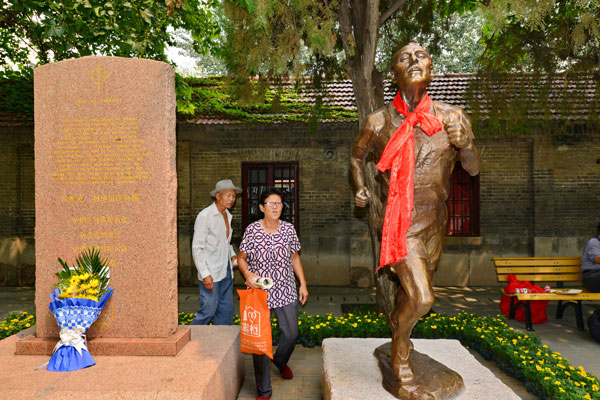Chinese city salutes a very British hero with a statue
Updated: 2015-08-19 16:44
By Chris Peterson(China Daily Europe)
|
|||||||||||
 |
|
A statue of Olympic gold medallist Eric Henry Liddell was unveiled in Weifang, East China's Shandong province, earlier this week. [Photo by Ju Chuanjiang/China Daily] |
In the past few days all eyes have been on Tianjin and the industrial explosions which rocked it last week, killing at least 114, injuring hundreds and leaving 70 people, including many firefighters, missing.
But in the nearby city of Weifang, a different kind of event was being marked, as the city's authorities took the very unusual step of commemorating a very British hero.
Scottish missionary, rugby international and Olympic gold medallist Eric Liddell died in the Weihsien Japanese internment camp in Weifang in February 1945 and is revered by many local Chinese as a hero for both his sporting prowess and his selfless work at the camp before his death from a brain tumour.
Liddell was born to Scottish missionary parents in the nearby city of Tianjin in January 1902, and apart from two stretches of leave in Scotland, spent his life in the area. He refused to leave as the Japanese advanced, staying behind to continue his missionary and teaching work while his pregnant wife went to Canada with their two daughters; in 2008 it was revealed that British wartime leader Winston Churchill brokered a deal with the Japanese allowing him to leave the camp, but he refused and gave his place to a pregnant woman.
A statue of Liddell was unveiled earlier this week in the presence of local officials and Liddell's family,
His daughter Patricia, now 80, unveiled the statue, and told the Times of London: "I find it extraordinary that a statue has been raised – the Chinese don't really raise statues, maybe just for Mao Zedong.
"My father was multi-faceted. He didn't just appeal to religious people. He was born in China, he worked in China, he died in China. He didn't leave the Chinese people when the going got tough," she said.
His statue was raised alongside his grave and a memorial headstone. His remains weren't discovered until 1989, buried near what had been the Japanese Officers' Quarters in a local school, which is still in use today.
Liddell's exploits on the running track were characterised in the British Oscar-winning movie Chariots of Fire in 1981, and another film about him, entitled The Last Race, is due to be released next March.
To contact the writer: chris@mail.chinadailyuk.com
Related Stories
China highlights contributions by Indians in helping defeat Japanese fascists in WWII 2015-08-18 23:00
An 81-year-old lady and her WWII memorial hall in San Francisco 2015-08-17 20:12
Remains of WWII US aircraft displayed in SW China 2015-08-17 09:12
Museum collects remains of WWII US aircraft 2015-08-11 17:30
Child soldier's memories of WWII passed down 2015-08-07 07:52
Today's Top News
Man in yellow shirt is Bangkok bomber: Police
Insured losses from Tianjin blasts could reach $1.5 billion: Fitch
Chinese city salutes a very British hero with a statue
Beijing dismisses reports of Abe's China visit in September
Europe struggles to respond as migrants numbers rise threefold
Six Chinese nationals confirmed dead in Bangkok blast
Rain in Tianjin poses no health risk, says official
Two HK women among four Chinese killed in Bangkok blast
Hot Topics
Lunar probe , China growth forecasts, Emission rules get tougher, China seen through 'colored lens', International board,
Editor's Picks

|

|

|

|

|

|






